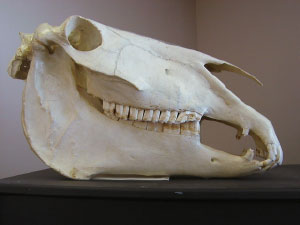Fall is a Crucial Time for Dental Check-ups, Especially for Senior Horses
By: Henrietta Coole
With winter around the corner, now is the time for a dental check-up and nutritional status assessment, especially for older horses. Compared to spring and summer, horses burn significantly more calories through fall and winter simply to stay warm. As a result, they need to eat more – placing increased strain on the teeth and jaw. As well, with the dietary shift from pasture to hay, your horse will have to chew with more force to meet its nutritional requirements.
Perhaps it’s time for a routine dental float? Or, maybe it’s the season to think about changing from hay to soaked hay cubes to maximize your aging horse’s feed efficiency during the upcoming winter season.
Learn more about dental care for your senior horse on Equine Guelph’s online healthcare tool – the Senior Horse Challenge. Check out The Tale of the Teeth Video and read a new Senior Horse Dental Care fact sheet provided courtesy of Alex Bianco, MS, DVM, University of Minnesota Extension. This resource includes frequently asked questions about sedation, aftercare and recommended diets for horses with many missing teeth.
Aside from the natural expiration of teeth, geriatric horses are also prone to dental disease that can result in teeth falling out or being extracted by a veterinarian. Because each set of premolars and molars erupts at a different age, they also expire at different ages. These can lead to gaps between teeth and teeth of varying heights (“wave mouth”) which causes abnormal chewing patterns and uneven wear on the teeth.
These variations in dentition, combined with the rough nature of forage and the natural bacterial population of the mouth, can lead to secondary infections of the teeth below the gum line, at the tooth root. Bacterial tooth root infections typically result in loose, and/or fractured teeth. If the tooth is an upper molar, the infection may also spread in to the maxillary sinus and cause a secondary bacterial sinusitis. While dental infections rarely lead to systemic disease, dental abnormalities or tooth root infections often result in ineffective or painful chewing which results in decreased feed intake, weight loss, and increased risk of esophageal obstruction (“choke”).
Remember that senior horses often need more frequent dental exams than the routine once a year check-up. Signs of dental issues include: dropping feed, bad breath, nasal discharge and/or weight loss.
While you’re visiting the Senior Horse Challenge to learn more about dental care for your aging horse, take five minutes to answer 20 questions to test your healthcare IQ for general geriatric care. This online tool will provide you information ranging from metabolic disorders to locomotion related concerns − pain recognition to general management including dental care.
Equine Guelph thanks Boehringer Ingelheim for sponsoring the Senior Horse Challenge online healthcare tool.
Sign up for our monthly E-news and stay up to date on Equine Guelph research, performance, education and special events.











